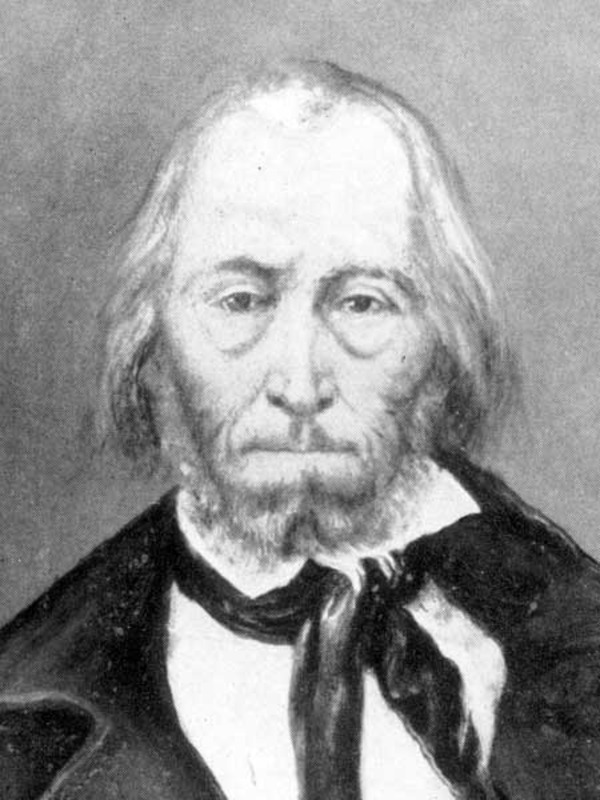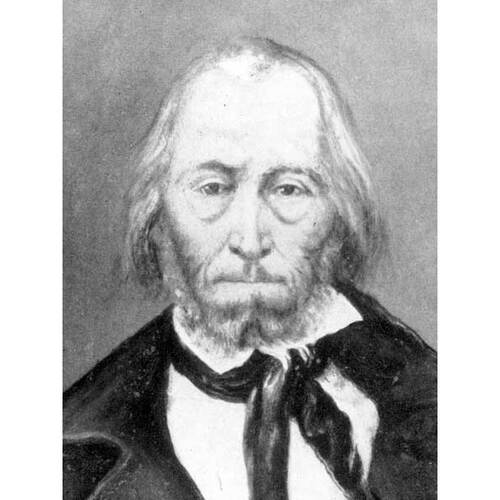
Source: Link
FALCON, PIERRE (or jocularly Pierriche – Pierre the rhymer), poet and song-writer, a Métis of Red River; b. 4 June 1793 at Elbow Fort (near present-day Swan River, Manitoba), in the Swan River Department of the North West Company; d. 26 Oct. 1876 at Saint-François-Xavier, Man.
Pierre Falcon was named after his father, an employee of the North West Company. His mother was an Indian woman said by early historians to have been from the Missouri country but believed by her descendants to have been a Cree. As a child Pierre was taken to Lower Canada and baptized at L’Acadie (Saint-Jean County) on 18 June 1798. He apparently lived with relatives, and although early historians described him as unlettered, he learned to read and write. At the age of 15 young Falcon returned to Red River to become a North West Company clerk. In 1812 he married Mary, daughter of the Métis Cuthbert Grant* Sr; the couple had three sons and four daughters. After the amalgamation of the Hudson’s Bay Company and the North West Company in 1821, Falcon served the new company until 1825.
With a number of other Métis families, he then followed Cuthbert Grant* Jr to Grantown (Saint-François-Xavier) on the White Horse Plain. There the group settled, and the 1838 census listed Falcon as having 30 acres of land under cultivation. By 1849 he was shown with only 15 acres since the remainder had been divided among his sons. He was a justice of the peace for the settlement.
Pierre Falcon, described by his descendants as an excitable and quick-moving man, had a poet’s feeling for words and a musician’s sense of rhythm, and he used them to put local incidents into songs. An armed clash between a party of mounted Métis under Cuthbert Grant Jr and the Selkirk settlers under Governor Robert Semple*, at Seven Oaks (in present-day Winnipeg) on 19 June 1816, was the subject of his best known song, “La Chanson de la Grenouillère.” Another Métis ballad, entitled “Le Lord Selkirk au Fort William, ou La danse des Bois-Brûlés,” tells a further part of the story of Seven Oaks. In retaliation for events at Red River, Lord Selkirk [Douglas*] and his soldiers, en route to the settlement, seized the Nor’Westers’ headquarters at Fort William in August 1816. A ball held there later by Selkirk is what is described in this ballad, attributed to Falcon. A third song to survive is “Ballade du général Dickson,” describing the departure from Grantown in 1837 of an American adventurer, James Dickson*, who dreamed of setting up an Indian kingdom in California.
During the Red River troubles of 1869–70, Falcon, though advanced in years, wished to accompany the party of Métis going to the boundary to stop Governor William McDougall*’s entry into the settlement in October 1869. He protested: “While the enemy is occupied in despatching me, my friends can strike hard and get in many good blows.” Prevented from participating he wrote instead a song of mockery, “Les tribulations d’un roi malheureux,” which was set to the tune of “The wandering Jew.”
Pierre Falcon is said to have composed many other songs describing the daily life of the voyageurs on the rivers and the hunters on the plains. Agnes Laut’s “The buffalo hunt” is believed to be a romanticized free translation of the lyrics of a song by Falcon. The bard’s songs were carried by the voyageurs from the St Lawrence to the Mackenzie, and Lake Falcon in Manitoba was named by them in his honour. His ballads were also sung by the Métis to the accompaniment of the fiddle around prairie camp fires. Regrettably, the words of many of Falcon’s songs were never written down and have been lost.
[Pierre Falcon’s extant songs are given in M. A. MacLeod, Songs of old Manitoba; with airs, French and English words, and introductions (Toronto, [1960]), 1–40. The following three articles by Mrs MacLeod each give one of Falcon’s songs with its background; the first article has biographical information on Falcon, and the second includes a picture of him: M. A. MacLeod, “Bard of the Prairies,” Beaver, outfit 286 (spring 1956), 20–25 ; “Dickson the liberator,” Beaver, outfit 287 (summer 1956), 4–7; “Songs of the insurrection,” Beaver, outfit 287 (spring 1957), 19–23. For variants in the tune of “Chanson de la Grenouillère’” and biographical information on Falcon see: Margaret Complin, “Pierre Falcon’s ‘Chanson de la Grenouillère’” RSCT, 3rd ser., XXXIII (1939), sect.ii; 49–58. b.p.]
Cite This Article
Bruce Peel, “FALCON, PIERRE (Pierriche),” in Dictionary of Canadian Biography, vol. 10, University of Toronto/Université Laval, 2003–, accessed December 19, 2025, https://www.biographi.ca/en/bio/falcon_pierre_10E.html.
The citation above shows the format for footnotes and endnotes according to the Chicago manual of style (16th edition). Information to be used in other citation formats:
| Permalink: | https://www.biographi.ca/en/bio/falcon_pierre_10E.html |
| Author of Article: | Bruce Peel |
| Title of Article: | FALCON, PIERRE (Pierriche) |
| Publication Name: | Dictionary of Canadian Biography, vol. 10 |
| Publisher: | University of Toronto/Université Laval |
| Year of publication: | 1972 |
| Year of revision: | 1972 |
| Access Date: | December 19, 2025 |



